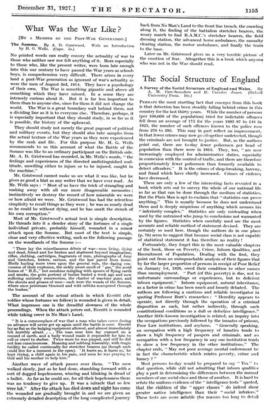What Was the War Like ?
• [By A MEMBER OF THE POST-WAR GENERATION.] The Somme. By A. D. Gristwood. With an Introduction by H. G. Wells. (Cape. Os.)
No printed words can really convey the actuality of war to those who neither saw nor felt anything of it. More especially to those who, like the present writer, were born late enough into this our century to have passed the War years as school- boys, is comprehension very difficult. There arises in every land a post-War generation as ignorant of war's actuality as were the men of August 3rd, 1914. They have a psychology of their own. The War is something gigantic and above all something which they have missed. In a sense they are intensely curious about it. But it is far less important to them than to anyone else, since for them it did not change the world. The War is a great boundary wall behind them, not a dividing line as it is to everyone else. Therefore, perhaps, it is especially important that they should study, in so far as it is possible, the history of the upheaval.
They should study not merely the great pageant of political and military events, but they should also take samples from the actual texture of the War years as they were experienced by the rank and file. For this purpose Mr. H. G. Wells recommends to us this account of what the Battle of the Somme was like to an ordinary participant on the British side. Mr. A. D. Gristwood has recorded, in Mr. Wells's words, "the feelings and experiences of the directed undistinguished mul- titude, unwilling either to injure or to be injured, caught in the machine."
Mr. Gristwood cannot make us see what it was like, but he gives as good a hint as any writer that we have ever read. As Mr. Wells says : "Most of us have the trick of strangling and making away with all our more disagreeable memories ; instinctively we destroy the record of how miserable we were or how afraid we were. Mr. Gristwood has had the relentless simplicity to recall things as they were ; he was as nearly dead as he could be without dying, and he has smelt the stench of his own corruption."
Most of Mr. Gristwood's actual text is simple description. He threads into it a slender story of the fortunes of a single individual private, probably himself, wounded in a minor attack upon the Somme. But most of the text is simple, clear and very effective writing, such as the following passage on the woodlands of the Somme :—
" There lay the miscellaneous debris of war—men living, dying and dead, friend and foe broken and shattered beyond imagination, rifles, clothing, cartridges, fragments of men, photographs of Amy and Gretchen, letters, rations, and the last parcel from home. Shells hurling more trees upon the general ruin, the dazing con- cussion of their explosion, the sickly sweet smell of "gas," the acrid fumes of " H.E.," hot sunshine mingling with spouts of flying earth and smoke, the grim portent of bodies buried a week ago and now suffering untimely resurrection, the chatter of machine guns, and the shouts and groans of men—such were the woods of the Somme, where once primroses bloomed and wild rabbits scampered through the bushes."
The account of the actual attack in which Everitt (the soldier whose fortunes we follow) is wounded is given in detail. What impresses one is the dreadful slowness of the whole proceedings. When the attack peters out, Everitt is wounded while taking cower in No Man's Land.
"it is a commonplace of war that a man who takes cover during an advance will never get up again until the battle is over. Everitt !ayes flat as the bulging equipment allowed, and almost immediately felt horribly afraid. . . . The man near him lay exposed on a mound of earth, and a body wound made it impossible for him to roll or erawl to shelter. Twice more he was pipped, and still he did ncit lose consciousness. Moaning and sobbing miserably, with tragic futility he called continually for stretcher bearers (as though such could live for a moment in the open). 'it hurts so, it hurts so,' he kept crying, a child again in his pain, and soon he was praying to God and his mother to help him.'
Another wave of attack passes over them. "The men walked slowly, just as he had done, stumbling forward with a sort 'a dogged hopelessness, wincing and blinking in dread of a bullet. As far as he could see, for all their hopelessness there was no tendency to give up. It was a miracle that so few were hit." After the attack has died down and night has come the wounded are gradually brought in and we are given an extremely detailed description of the long complicated journey back from No Man's Land to the front line trench, the crawling along it, the finding of the battalion stretcher bearers, the weary march to find R.A.M.C.'s stretcher bearers, the field dressing station, the advanced horse ambulance, the casualty clearing station, the motor ambulance, and finally the train to the base.
Later on Mr. Gristwood gives us a very terrible picture of the emotion of fear. Altogether this is a book which anyone who was not in the War should read.


























 Previous page
Previous page